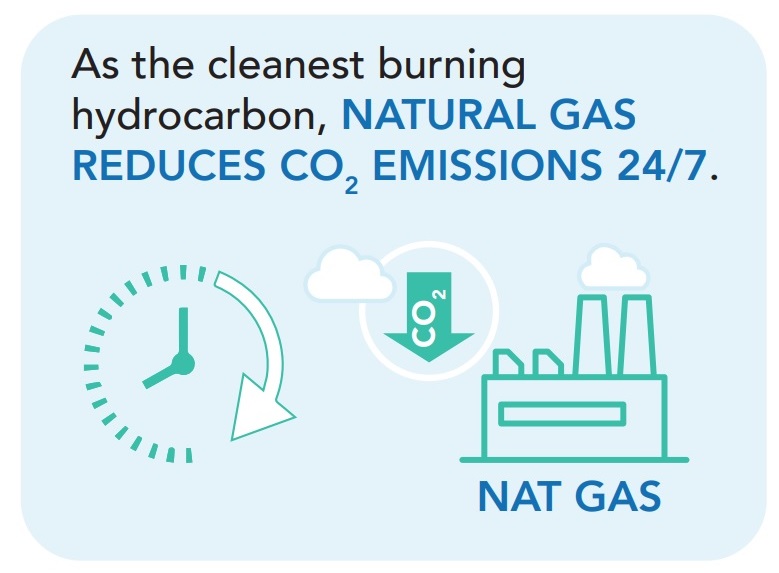Natural gas, like other energy sources, has an impact on the environment. This page explores policy issues associated with the environmental footprint of natural gas, including emissions. NGSA recognizes that the use of fossil fuels leads to increased concentrations of greenhouse gases in the atmosphere, which contribute to climate change.
- NGSA supports the ambition of achieving economy-wide net zero GHG emissions by 2050, consistent with our support for the goals of the Paris Agreement.
- NGSA advocates for rules, policies, and technologies that protect the environment while allowing our members to continue to supply electric utilities, manufacturers, businesses and households with affordable and reliable natural gas.
- Energy policies must allow consumers to reap the benefits of our natural gas resources, ensuring that no consumers are left behind as we transition to a clean and affordable energy future.
Policy Issues
Natural gas has played a significant role in reducing CO2 emissions from the U.S. power sector to 25-year lows because of its relatively low carbon content and because of its role as an integral partner to renewables. NGSA members believe that adopting a price on carbon can further drive down carbon emissions, while protecting consumers and maintaining competition and innovation in power markets. Some recent related documents appear below, for more please visit our Resources pages and use the “search” and “tag” functions.
- The Natural Gas Industry is Actively Reducing Emissions (Jan. 2024)
- NGSA Comments to CEQ Supporting Notice of Interim Guidance Document, “Carbon Capture, Utilization, and Sequestration Guidance” (April 18, 2022)
- Proposed Carbon Pricing Policy Statement an Important Signal, NGSA Tells FERC (November 16, 2020)
- NGSA Reaffirms Support for Carbon Pricing to Achieve Emissions Reductions (September 30, 2020)
- Dena Wiggins Prepared Remarks on Carbon Pricing at FERC Technical Conference (September 30, 2020)
- Coalition Applauds FERC Decision to Hold Carbon Pricing Discussion (June 18, 2020)
- Power Generators, Industry Groups and Think Tanks Ask FERC to Examine Carbon Pricing (April 14, 2020)
- NGSA Announces Support for Price on Carbon in Power Markets (Dec. 3, 2019)
- Factsheet: NGSA Position on Carbon Pricing (Dec. 3, 2019)
- Chart: Increased Use of Natural Gas Drives CO2 Savings in 2005-2018 (Data: EIA Monthly Energy Review, 2020)
- Chart: U.S. Leads the World in Carbon Reductions 2005-2017 (Data: EIA)

NEPA is a fundamental tool to ensure the appropriate protection of the environment in federal regulations, mandating that federal agencies consider environmental impacts of their proposed actions. NGSA advocates for clear timelines and a clearly-defined scope for the effective implementation of NEPA by federal agencies, states and tribes so that needed infrastructure for economic growth can proceed with greater regulatory certainty and environmental protections. Some recent related documents appear below, for more please visit our Resources pages and use the “search” and “tag” functions.
- NGSA Statement on CEQ NEPA Phase 1 Rule (April 19, 2022)
- NGSA-Center for LNG Statement on Modernization of NEPA (July 15, 2020)
- NGSA-Center for LNG Comments on Proposed Modernization of NEPA Guidelines (March 10, 2020)
- NGSA-Center for LNG Statement on Proposed Modernization of NEPA Guidelines (Jan. 9, 2020)
- NGSA-Center for LNG Statement on CEQ’s Draft NEPA Guidance (June 21, 2019)
- NGSA-CLNG Comments on CEQ Proposal to Update NEPA Regulations (Aug. 20, 2018)
- Natural Gas and LNG Suppliers Sound Warning on Feasibility and Consequences of Expansion of FERC Review Requirements (Jan. 29, 2016)
- The Natural Gas Industry is Actively Reducing Emissions (Jan. 2024)
- Developing the Natural Gas of the Future (October, 2023)
- Clean Energy Future: The Role of Natural Gas (September, 2023)
- NGSA Statement on NPC Infrastructure and Carbon Capture Reports (Dec. 12, 2019)
The natural gas industry is lowering cost for the consumer, maintaining grid reliability and actively reducing methane  emissions from all parts of our supply chain. NGSA members are committed to reducing methane emissions and making significant investments in processes and technologies to address emissions and reduce flaring. They are improving the quality of methane data to achieve greater transparency and promote better understanding of the challenges of managing methane emissions.
emissions from all parts of our supply chain. NGSA members are committed to reducing methane emissions and making significant investments in processes and technologies to address emissions and reduce flaring. They are improving the quality of methane data to achieve greater transparency and promote better understanding of the challenges of managing methane emissions.
- The Natural Gas Industry is Actively Reducing Emissions (Jan. 2024)
- NGSA’s Principles on Addressing Methane Emissions: Our Commitment to a Lower Carbon Energy Future (Oct. 5, 2020)
- Addressing Methane Emissions Essential to Achieving Clean Environment, Says NGSA (Oct. 5, 2020)
- What our member companies are doing to reduce methane
- Natural Gas Council Statement on ICF Report on Methane Emissions, “Finding the Facts on Methane Emissions, A Guide to the Literature” (Apr. 26, 2016)
- Natural Gas Council 1-page Summary of ICF’s “Finding the Facts on Methane Emissions” (Apr. 26, 2016)
NGSA advocates for clear language, timelines and scopes on regulatory permitting around Section 401 of the Clean Water Act.
Comparison of Environmental Footprint of Natural Gas
Leidos, Inc. analyzed and compared the economics, emissions, reliability, cost and environmental footprint of natural gas to other major energy sources of electricity in a 2017 report measured in terms of electricity delivered to 1,000 U.S. households per year.
